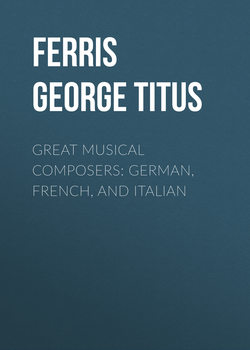Читать книгу Great Musical Composers: German, French, and Italian - Ferris George Titus - Страница 9
HANDEL
VII
ОглавлениеHandel returned to London, and composed a new oratorio, “Samson,” for the following Lenten season. This, together with the “Messiah,” heard for the first time in London, made the stock of twelve performances. The fashionable world ignored him altogether; the newspapers kept a contemptuous silence; comic singers were hired to parody his noblest airs at the great houses; and impudent Horace Walpole had the audacity to say that he “had hired all the goddesses from farces and singers of roast-beef, from between the acts of both theatres, with a man with one note in his voice, and a girl with never a one; and so they sang and made brave hallelujahs.”
The new field into which Handel had entered inspired his genius to its greatest energy. His new works for the season of 1744 were the “Dettingen Te Deum,” “Semele,” and “Joseph and his Brethren;” for the next year (he had again rented the Haymarket Theatre), “Hercules,” “Belshazzar,” and a revival of “Deborah.” All these works were produced in a style of then uncommon completeness; and the great expense he incurred, combined with the active hostility of the fashionable world, forced him to close his doors and suspend payment. From this time forward Handel gave concerts whenever he chose, and depended on the people, who so supported him by their gradually growing appreciation, that in two years he had paid off all his debts, and in ten years had accumulated a fortune of £10,000. The works produced during these latter years were “Judas Maccabæus,” 1747; “Alexander,” 1748; “Joshua,” 1748; “Susannah,” 1749; “Solomon,” 1749; “Theodora,” 1750; “Choice of Hercules,” 1751; “Jephthah,” 1752, closing with this a stupendous series of dramatic oratorios. While at work on the last, his eyes suffered an attack which finally resulted in blindness.
Like Milton in the case of “Paradise Lost,” Handel preferred one of his least popular oratorios, “Theodora.” It was a great favourite with him, and he used to say that the chorus, “He saw the lovely youth,” was finer than anything in the “Messiah.” The public were not of this opinion, and he was glad to give away tickets to any professors who applied for them. When the “Messiah” was again produced, two of these gentlemen who had neglected “Theodora” applied for admission. “Oh! your sarvant, meine Herren!” exclaimed the indignant composer. “You are tamnable dainty! You would not go to ‘Theodora’ – dere was room enough to dance dere when dat was perform.” When Handel heard that an enthusiast had offered to make himself responsible for all the boxes the next time the despised oratorio should be given – “He is a fool,” said he; “the Jews will not come to it as to ‘Judas Maccabæus,’ because it is a Christian story; and the ladies will not come, because it is a virtuous one.”
Handel’s triumph was now about to culminate in a serene and acknowledged pre-eminence. The people had recognised his greatness, and the reaction at last conquered all classes. Publishers vied with each other in producing his works, and their performance was greeted with great audiences and enthusiastic applause. His last ten years were a peaceful and beautiful ending of a stormy career.
